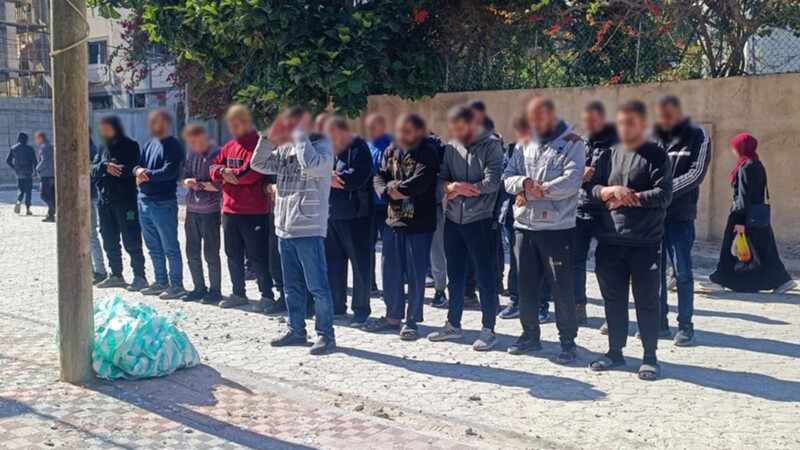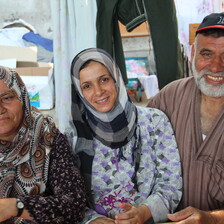The Electronic Intifada 6 September 2024

Neighbors gather to pay their last respects to Dayya and Rasha.
Dayya, a 79-year-old woman, was fond of her garden and spent a lot of time taking care of the flowers and trees.
Her daughter, Rasha, 52, was passionate about her cats and cared for more than 20.
Dayya had three other daughters who had left Gaza long before the genocide due to the difficult economic circumstances here. When her father died more than 15 years ago, Rasha dedicated her life to caring for her mother. They lived alone in a house in the quiet al-Rimal neighborhood in Gaza City.
The two women built good relationships with all their neighbors, considering them their extended family. They were known in the neighborhood as people with big hearts full of kindness for everyone. Dayya, in particular, was like a mother to others, neighbors said, and her house was a place of peace that embodied Palestinian values of hospitality and generosity.
By the end of January, over three months into Israel genocide in Gaza, Israeli soldiers had already raided al-Rimal three times, destroying everything in their path.
Dayya and Rasha’s neighbor, Abul Rahman Joud, 33, said that “during each raid, Dayya and Rasha remained steadfast in their house, ignoring all Israeli threats to move to the south of the Gaza Strip. They were deeply attached to their beloved house.”
Forced to leave
But eventually, the Israeli military stormed the house.
The women pleaded with the soldiers to let them stay, but to no avail. The military order was clear: They had to leave immediately, and go south.
At 3:15 pm, on Friday, 2 February, it was cold, rainy and getting dark. The mother and daughter left their house. Neighbors said they had tears streaming from their eyes, and did not dare to look back.
They knew they couldn’t walk fast and their slow pace would make it impossible to reach Deir al-Balah, 15 kilometers to the south, before the next morning. There were no cars, not even animal-drawn carts, and the soldiers rejected their pleas to wait until morning to leave.
On their way, they encountered tanks, snipers, random artillery shelling and many bombed-out houses and cars, they told Dayya’s son, Osama, who had been displaced to the south since the beginning of the Israeli genocide and was preparing for their arrival.
Neighbors also tried to keep in touch with the two women.
“Around 4:10 pm, Rasha answered my call and said that the place seemed like a terrible desert, with no one there but horrible dogs,” Shadi Eisa said.
Then, all subsequent calls went unanswered.
A frustrating, fruitless search
For eight days, there was no information about the two women.
But once the Israeli army announced a withdrawal, many people returned to check their houses and search for missing relatives and friends.
Dayya and Rasha’s neighbors wasted little time in looking for them. But the streets were littered with corpses mauled by stray dogs.
Everyone had questions.
Could Dayya and Rasha have found shelter?
If so, why hadn’t they made contact with loved ones?
Witnesses told neighbors they had seen two women in the afternoon the day of their eviction in a nearby area. One of the women was supporting the other with one hand, while carrying a white flag in the other.
The witnesses said several Israeli strikes had hit the area at the time, covering it in heavy dust.
The search then focused on that area and eventually led to the grim discovery of scattered body parts believed to be those of Dayya and Rasha.
The neighbors gathered the remains, put them in one shroud, and returned to the women’s house.
Burial site requested and honored
When Dayya had become seriously ill a month earlier, she had asked Shadi Eisa to bury her under a particular tree in her garden if she died. She would have her wish fulfilled, albeit under completely different and unexpected circumstances.
Grieving neighbors and friends held funeral prayers in front of the burial site as a sense of sorrow along with memories of the women’s kindness descended over the neighborhood.
Dayya’s son, Osama, who was in Deir al-Balah, could not attend the funeral. He was heartbroken.
One of the neighbors told The Electronic Intifada that the two women “left their home with broken hearts and returned as scattered remains.”
And tragedy did not stop there.
Fayez Sharif, 72, Dayya and Rasha’s gardener for 35 years, had stayed in the house since their killings, a safe shelter for a loyal employee.
Until it wasn’t. On 8 July, Israeli soldiers stormed the house again. Fayez was killed with a bullet to the forehead.
Sami A. Akkeila is a journalist based in Gaza.



